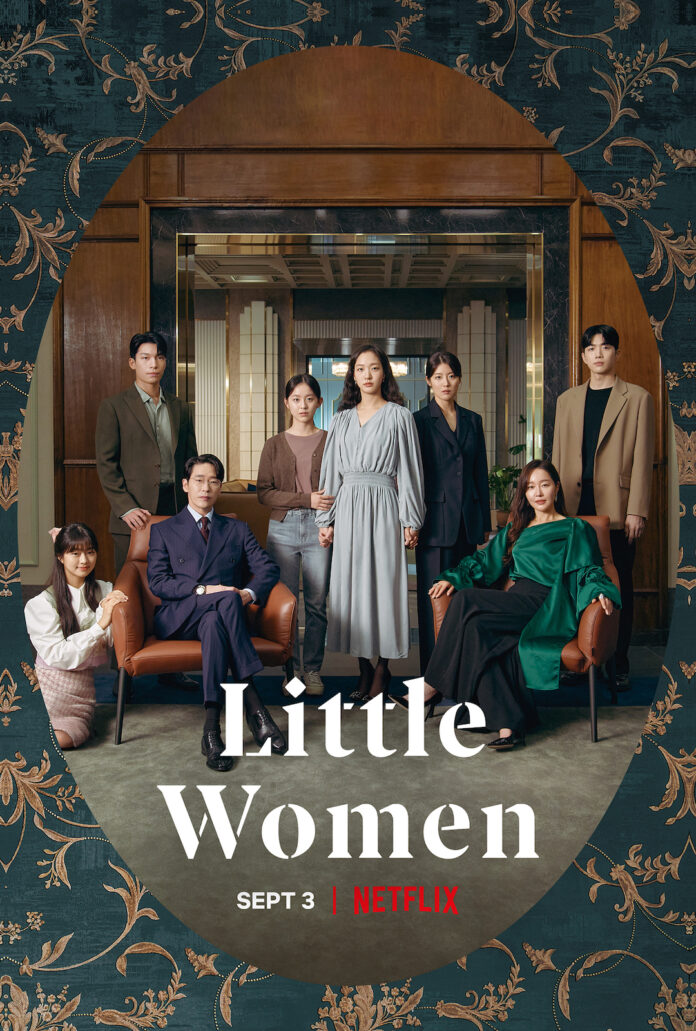Regardless of financial status, the show portrays how money alone can’t solve human problems
By SARAH HAN — arts@theaggie.org
Content warning: This article contains discussions of suicide and death that readers may find disturbing.
Netflix’s K-drama “Little Women” depicts the financially challenging lives of the Oh sisters — Oh In-ju, Oh In-kyeong and Oh In-hye. The sisters, who face financial adversity, unknowingly become involved with the wealthy and reputable Park family after In-ju finds her friend Jin Hwa-young dead in Hwa-young’s closet.
Seemingly perfect on the outside yet nowhere close to it on the inside, Park Jae-sang and Won Sang-a are the parents of daughter Park Hyo-rim. Due to their tremendous wealth and reputation, Park Jae-sang runs to be a candidate for the President of South Korea, while Won Sang-a and Park Hyo-rim pose as the perfect wife and daughter. All the while, they hide away marital conflict, drug addiction and most importantly, the murders of those that get in their way.
In contrast, the Oh family’s problems are relatively transparent; their mother suddenly flees to the Philippines, leaving the sisters with insufficient money and the unresolved grief of their late sibling who passed away due to the family’s inability to afford healthcare. Another problem arises when In-ju finds her friend Hwa-young dead in her closet. With In-ju’s desire to find the killer and In-kyeong’s passion for investigative news reporting, they suspect the Park family of not only murdering Hwa-young but also being responsible for many other murders.
Right from the beginning, I noticed that “Little Women” established that money can’t fix problems. Director Kim Hee-won seemed to frequently juxtaposes the Park family and Oh family to show that despite their nearly opposite financial statuses, they deal with the same human problems.
Director Kim’s use of perspectives also shows that nothing can be labeled as ‘good’ or ‘bad’ because everyone has a motive behind their actions. In-kyeong’s rival news reporter says a quote that encapsulates this perfectly: “We all have our own version of truths. Sometimes, your truth will win. Today, my truth won.”
Even though the rival news editor sides with the antagonist since she works for the Park family, I felt that what she said was not solely out of attacking In-kyeong. Everybody has their own truth, and although the drama labels the Park family’s side as ‘bad’ and the Oh sisters’ as ‘good,’ we can’t deny that one truth is worth less than the other truth.
Despite this, the show does not make it easy for viewers to empathize with all characters, which is my main critique. Yes, the drama did give a snippet of everyone’s backstory, but I felt that it gave more screen time to the Oh sisters’ and less to the Park family’s. This counters the drama’s intended emphasis on perspectives because it’s not giving equal weight to everyone’s.
You may be thinking the Oh sisters deserve more screen time for their backstories because they are the main characters, but I disagree; I think in order for a drama to accurately portray reality, it needs to give equal weight to all perspectives regardless of the character’s role. The drama needs to incorporate a segment of each character’s past, even if it means a more even distribution of screen time. This way, the viewers can actually empathize with each character rather than pitting them against each other and ultimately see that they all suffer in some way.
I also found that the show left many questions unanswered. I understand that dramas can seemingly make anything possible because it’s not real life, but I feel like they should aim to depict reality as best they can.
Despite these critiques, I appreciate the drama’s focus on how humanity is the greatest influence on one’s behavior. In the show, money was only the tool that conveyed to me how once one’s humanity is disturbed, they transform into a whole new person. For Sang-a, her humanity was already being tested due to her parents’ relationship. When she accidentally pushed her mother to her death is when her humanity finally broke, resulting in the murder spree of anyone she dislikes.
As for In-ju, money was the only thing that her life revolved around. Even if her sisters were her top priority, this was partly due to the fact that the family didn’t have enough money to save their late sibling from passing away. Moreover, she shows her affection through financial support; for example, she always gives In-hye money so that she wouldn’t have to worry about poverty. But throughout the story, In-ju realized that greed only turns people into monsters. Money only provides temporary relief and is not a permanent fix for one’s problems. Therefore, In-ju transformed from a person obsessed with financial status to someone who resents chasing money.
Although the series shows how money can transform your humanity, in many moments it also proves that humanity cannot be truly, permanently erased, no matter how extreme the circumstances. This can especially be seen when characters are the most vulnerable. For example, the Park family’s assistant Choi Do-il is very stoic throughout the show; however, he breaks down when he sees his mother lying on the hospital bed, illustrating that even the most outwardly emotionless people still deal with painful feelings.
Sang-ah, despite her obsession with murder, also shows humanity when she expresses regret for and confesses to accidentally killing her mom. Regardless of how corrupt someone is, they still show a capacity for a range of human feelings.
“Little Women” explores how greed and financial hardship affects different characters, showing how people are easily manipulated, deceived and desperate during times of difficulty. However, it also shows that in the midst of financial adversity, people will unwittingly hold onto their humanity. In the end it’s not the money that matters, but the way money highlights the universal difficulties of the human experience.
Written by: Sarah Han — arts@theaggie.org










